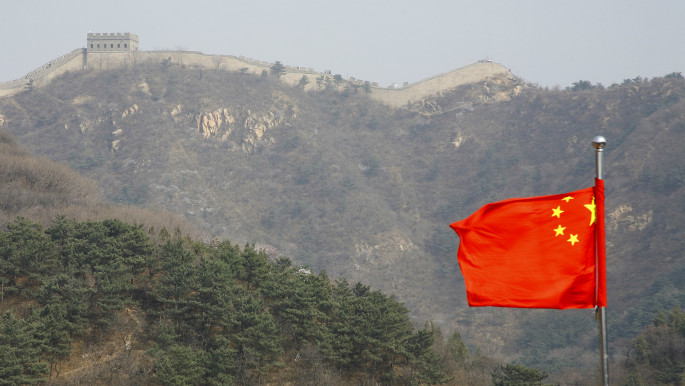How Jamal Khashoggi's death brought China and Saudi Arabia closer together
As the international community reflects on the first anniversary of Saudi dissident and journalist Jamal Khashoggi's death, neither Saudi Arabia's critics nor its supporters have taken much time to consider the role that the episode played in the influential monarchy's relationship with China, one of the most powerful countries in the world and a little-known but deep-pocketed participant in Middle Eastern diplomacy.
In the eventful year since October 2, 2018, China and Saudi Arabia have built an alliance that owes as much to public relations as to economics.
After a task force of Saudi agents lured Khashoggi into Saudi Arabia's consulate in Istanbul and killed him there, the ensuing outcry forced Western businesses, think tanks, and universities to reconsider their ties to donors and investors in Riyadh.
In the United States, senators attempted to sever American support to the Saudi campaign in Yemen, and the Central Intelligence Agency linked Khashoggi's murder to Mohammed bin Salman (MbS), Saudi Arabia's crown prince.
In Beijing, no such reckoning occured. While Turkey and Western world powers questioned the shifting explanations for Khashoggi's dismemberment coming from Saudi diplomats, Chinese officials opted to ignore the bizarre saga in the name of preserving their relationships with their Saudi counterparts.
 |
While world powers questioned the shifting explanations for Khashoggi's dismemberment coming from Saudi diplomats, Chinese officials opted to ignore the bizarre saga in the name of preserving their relationships with their Saudi counterparts |  |
Some Western analysts even theorised that American and European criticism of MbS might push Saudi Arabia closer to China.
In a tacit confirmation of this possibility, China and Saudi Arabia inked a $10 billion deal a few months after the Khashoggi incident.
Read more here: 'China is a good friend to Saudi Arabia': MbS bags $10 billion Beijing oil deal
Though China has yet to go as far as defending Saudi Arabia's erratic handling of Khashoggi's death, a more aggressive step taken by Saudi allies, MbS seems to appreciate China looking past Saudi transgressions.
He has returned the favour by expressing his support for Chinese authorities' detention of hundreds of thousands of Muslims in the Chinese region of Xinjiang.
In many ways, Saudi Arabia's ever-expanding relationship with China mirrors the same cynicism that has informed other Middle Eastern countries' attempts to court world powers with money to spend but dubious records on human rights.
The UAE has painted India's ongoing crackdown in Kashmir as likely to "encourage further stability and peace" despite all evidence to the contrary.
Like China and India, Saudi Arabia and the UAE have a history of jailing dissidents at home, so neither Middle Eastern country has much incentive to advocate for human rights abroad.
As China and Saudi Arabia protect one another in the international community, the two continue to uphold their lucrative partnership in the petrochemical and petroleum industries.
 |
China and Saudi Arabia inked a $10 billion deal a few months after the Khashoggi incident |  |
China, Saudi Arabia's biggest partner in international trade, depends on fossil fuels from the Middle East to sustain its economic growth. The US's attempts to restrict Chinese imports from Iran through economic sanctions have only increased the importance of China's ties to Saudi Arabia.
In general, China has avoided criticising the domestic policies of its allies and suppliers as long as they adopt the same approach to China and respect China's claim to the autonomous island of Taiwan, a nonissue in the Middle East.
The lack of Chinese interest in Khashoggi's assassination offers just one example of this wider foreign policy, and, because China has invested many fewer diplomatic and military resources in the region than the US, the Khashoggi affair reverberated far louder in the congressional offices of Washington, DC, than it did in Beijing.
 |
|
| Read also: How China is heavily contributing to Middle East drone and missile proliferation |
Given Japan, South Korea, and other wealthy countries' search for economic opportunities in the Middle East and the Persian Gulf in particular, the number of investors willing to overlook Saudi Arabia's erratic domestic and foreign policies seems likely to grow further.
In fact, the attention of the international community only began to focus on Saudi Arabia's controversial campaign in Yemen, which has contributed to thousands of civilian deaths, in the wake of Khashoggi's.
Chinese Foreign Minister Wang Yi has noted that "China has all along attached great importance to the role of Saudi Arabia in regional and international affairs," adding, "China firmly supports Saudi Arabia in upholding its sovereignty, security and stability."
The Chinese Ambassador to Saudi Arabia, Li Huaxin, meanwhile, has referred to the Middle Eastern regional power as a "strategic partner and powerful ally."
If MbS' growing list of headline-grabbing misfires has yet to change China's mind, the basis of the Chinese-Saudi alliance seems secure for years to come.
Even if a bipartisan coalition of influential American politicians succeeds in its bid to hold Saudi Arabia accountable for the death of Khashoggi and the intervention in the Yemeni Civil War, the involvement of China means that Saudi Arabia can always seek assistance from another wealthy benefactor if need be.
Officials in Riyadh no longer have to rely on the US alone. If anything, Khashoggi's murder cemented a relationship that profits at the expense of human rights.
Austin Bodetti studies the intersection of Islam, culture, and politics in Africa and Asia. He has conducted fieldwork in Bosnia, Indonesia, Iraq, Myanmar, Nicaragua, Oman, South Sudan, Thailand, and Uganda. His research has appeared in The Daily Beast, USA Today, Vox, and Wired



